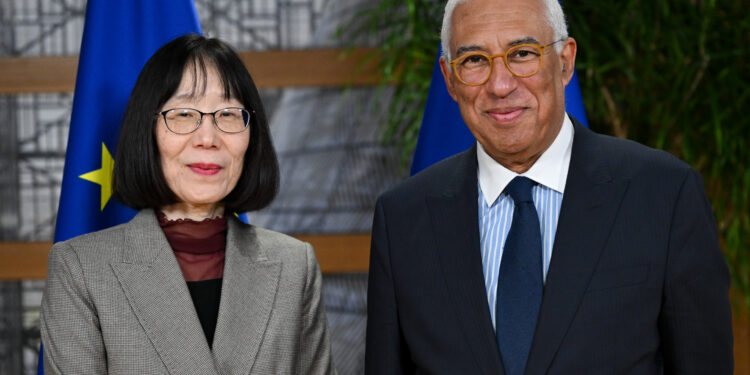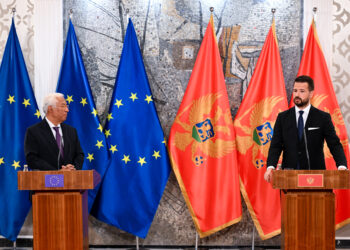Brussels – Multilateral justice institutions are under attack. From several fronts, the strongest coming from Washington, where Donald Trump signed an executive order authorizing aggressive economic sanctions against the International Criminal Court (ICC), accused of “illegitimate and baseless actions.” The EU shields the Hague-based Court but must watch its back: attempts to delegitimize the work of the ICC are also coming from member countries — from the doubts to implementing the arrest warrant for Benjamin Netanyahu to the Al Masri case in Italy.
Very cautious in responding to Trump’s provocations, so far, the President of the European Council, António Costa, and the President of the European Commission, Ursula von der Leyen, could not avoid a head-on confrontation with the Tycoon on an issue on which the credibility of the European Union itself ultimately depends. Yesterday (Feb. 6), Costa met with Tomoko Akane, a Japanese judge and President of the ICC, in Brussels to reiterate the EU’s commitment “to end impunity and ensure accountability for all violations of international law.”
Today, after the White House announcement, Costa commented in a post on X, “Sanctioning the ICC threatens the Court’s independence and undermines the international criminal justice system as a whole.” Von der Leyen echoed him shortly after stating that the Hague-based court “must be able to freely pursue the fight against global impunity.” The EU leader assured, “Europe will always stand for justice and respect for international law.
The ICC guarantees accountability for international crimes and gives a voice to victims worldwide.
It must be able to freely pursue the fight against global impunity.
Europe will always stand for justice and the respect of international law.
– Ursula von der Leyen (@vonderleyen) February 7, 2025
In essence, Trump signed an executive order authorizing aggressive economic sanctions against the Court, accusing the body of “illegitimate and baseless actions” against the United States and Israel. The order gives the President broad powers to impose asset freezes and travel bans on US soil against ICC officials and their families should Washington determine that they are involved in efforts to investigate or prosecute citizens of the United States and certain allies.

Benjamin Netanyahu and Donald Trump in the Oval Office of the White House, 4/2/25. (Photo by ANDREW CABALLERO-REYNOLDS / AFP)
The attack on the ICC by the United States – which has never recognized its authority and is not a signatory to the Rome Statute founding the ICC – comes just two days after the visit by Benjamin Netanyahu to the White House and is in effect retaliation for the issuance of arrest warrants for war crimes and crimes against humanity against the Israeli premier and his former Defense Minister Yoav Gallant. Trump said the International Criminal Court “abused its power” by issuing those warrants and that “this malicious conduct in turn threatens to violate the sovereignty of the United States and undermines the national security and foreign policy work of the United States government and our allies, including Israel.”
The United Nations immediately called on the United States to lift the sanctions. “We deeply regret the individual sanctions announced yesterday against Court personnel and call for this measure to be reversed,” said UN Office for Human Rights spokeswoman Ravina Shamdasani. In a statement, the ICC condemned the sanctions that “harm its independent and impartial judicial work” and appealed “to our 125 States Parties, civil society, and all nations of the world to stand united for justice and fundamental human rights.”
Israel rejoices. Orbán stands with Trump. Tajani calls for an investigation into the ICC for the Al Masri case
In addition to the United States, Israel is also not a member of the ICC. Netanyahu rejoiced at a decision that “will defend America and Israel from a corrupt, anti-American and anti-Semitic court that has no jurisdiction or basis to engage in legal action against us.” However, Trump’s attack on international justice has already resonated in Hungary, where Sovereignist Prime Minister Viktor Orbán was quick to question Hungary’s membership to the ICC: “It’s time for Hungary to review what we are doing in an international organization that is subject to sanctions by the United States,” said the New York tycoon’s number one fan premier.
Like all 27 European capitals, Budapest is part of the International Criminal Court. However, it is not the only EU capital where support for the Hague-based court is creaking. France, unwilling to guarantee Netanyahu’s arrest if he set foot in the Hexagon, combed through the Rome Statute in search of immunity for the Israeli premier. Germany invoked a “historical responsibility” to Israel because of the Holocaust, and more recently, Polish Prime Minister Donald Tusk guaranteed that he would not arrest Netanyahu if he decided to attend the 80th-anniversary commemoration of the liberation of the Auschwitz-Birkenau death camp.

Italian Foreign Minister and Deputy Prime Minister Antonio Tajani (photo: Samuel Corum/Afp)
Beyond the lofty reassurances of Costa and von der Leyen, what is emerging is the intermittent support by the European Union for international law. Only when it is convenient, or when the International Criminal Court accuses an enemy such as Vladimir Putin, fueling accusations by the Global South that Brussels uses “double standards.” The case of Al Masri — the Libyan torturer accused by the ICC, arrested in Italy, and then returned to Libya on a state flight — is quite emblematic. Even Deputy-Premier and Foreign Minister Antonio Tajani, who had already said in the days following the outbreak of the case that “The Hague is not the Mouth of Truth. One can also have different opinions,” has now threatened the opening of “an investigation into the Criminal Court” to clarify “how it has behaved.”
The attacks on the ICC and the Al Masri case in the European Parliament
The European Parliament will intervene on the issue next week with a scheduled debate on its agenda entitled Protecting the system of international justice and its institutions, in particular the International Criminal Court and the International Court of Justice. The European Left Group had requested the debate explicitly referring to the Al Masri case. However, the other political groups opted for a broader discussion. It will be a battle between Trumpian Sovereignists and the defenders of multilateralism. But it will also be another showdown between the governing parties and the Italian opposition.
There has already been a sense of what will come in a meeting with some Italian MEPs ahead of the February 10-13 plenary session. On the one hand Annalisa Corrado (PD), who denounced the “incredibly conflicting versions” of ministers Nordio and Piantedosi on the Al Masri affair and the government’s “discrediting” of the Italian and international judiciary “already under attack by Trump,” and Valentina Palmisano (M5S), for whom the Meloni government is trying “clumsily and embarrassingly to shift all the blame onto the ICC.” On the other hand, Denis Nesci, of the same party as Prime Minister Giorgia Meloni, reiterated the version that “it was not the Italian government that released Al Masri, but there was an action of the judiciary and an upstream problem with the International Criminal Court.”
English version by the Translation Service of Withub
![[foto: imagoeconomica]](https://www.eunews.it/wp-content/uploads/2023/09/Imagoeconomica_1917240-scaled.jpg.webp)





![Il presidente della Repubblica, Sergio Mattarella, con la presidente della Commissione europea, Ursula von der Leyen [Bruxelles, 21 maggio 2025. Foto: Emanuele Bonini per Eunews]](https://www.eunews.it/wp-content/uploads/2025/05/mattarella-vdl-120x86.png)


![Il presidente della Repubblica, Sergio Mattarella (sinistra), con il presidente del Consiglio Europeo, Antonio Costa [Bruxelles, 20 maggio 2025. Foto: Quirinale]](https://www.eunews.it/wp-content/uploads/2025/05/mattarella-costa-120x86.jpeg)